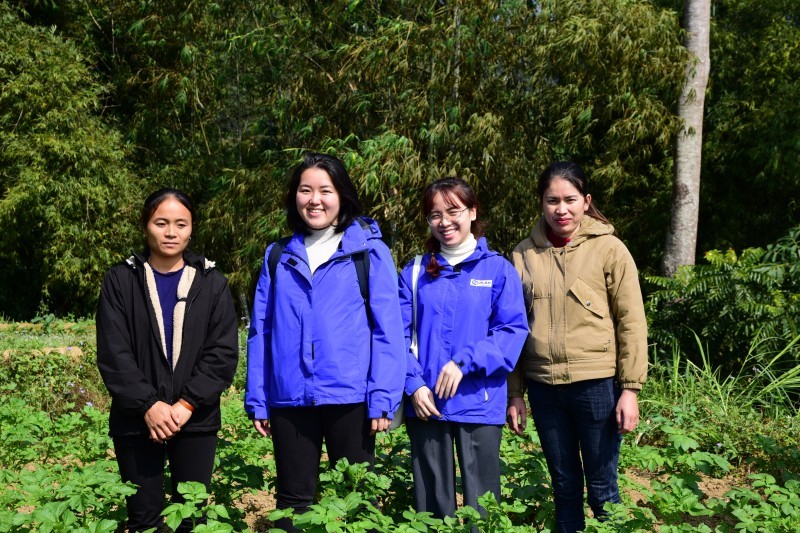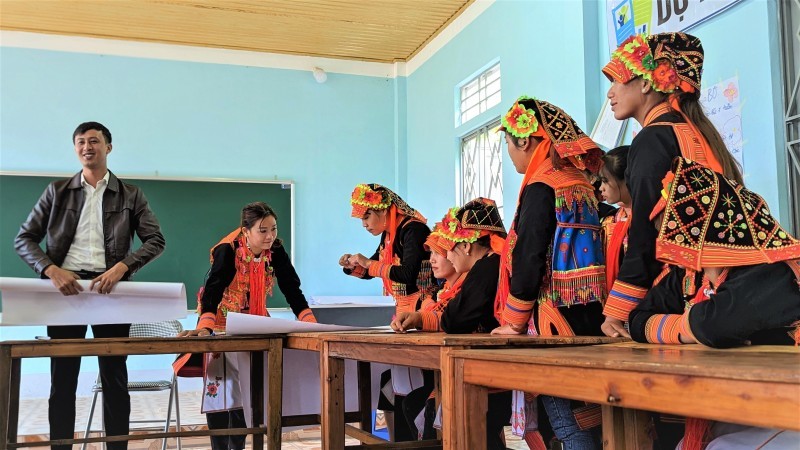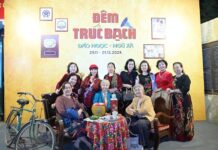 |
| Haruna Ishimaru came to Vietnam to work as a coordinator of Plan International. Photo provided by Haruna Ishimaru |
“When I was young, I often heard people say that women don’t need an income, that the sooner you get married to someone, the better. I always question this perspective because they don’t say the same things to men. Because this project is aimed at young people facing gender equality issues, I think this is a project that I can carry out with strong passion,” shared 30-year-old Haruna Ishimaru, a Japanese project coordinator of Plan International Vietnam in an interview with the Thoi Dai Magazine.
With Haruna, ethnic minority youth are truly optimistic and persistent in their efforts for gender equality. Working in Plan International in Vietnam, Haruna hopes to improve their livelihoods in regional areas such as Ha Giang and Lai Chau provinces.
As the coordinator of “Better livelihood for ethnic minority youth in Ha Giang and Lai Chau,” what do you hope to bring when participating in the project?
I hope to bring women’s empowerment and gender equality through better livelihood.
Is the work of a coordinator for the project “Better livelihood for ethnic minority youth in Ha Giang and Lai Chau” a new challenge for you?
Yes, this project was my first time as a project coordinator. It was also my first time in Vietnam, so I was afraid I might not be able to fit in at first. But thanks to the warm welcome from the colleagues and local partners in Vietnam, I got rid of these fears very quickly.
Reporter: It is also very difficult for a foreigner to work on a project in urban areas, plains, or easily accessible areas. Why did you choose Vietnam, specifically mountainous provinces, and not other localities?
Plan International Vietnam works in one of the most remote areas in Vietnam to support children and youth, and Ha Giang and Lai Chau is one of them. We chose this area because the rate of early marriage is very high there, especially among ethnic minority youth. They also have problems with maintaining livelihoods, as they rely strongly on traditional methods of agriculture and animal husbandry.
When I was in my youth, I was often told that women should not have income and the earlier you marry someone, the better by people close to me. I always questioned this idea because they do not say the same things to my male peers. Since this project targets youth facing issues with gender equality, I thought this is a project I can take on with strong passion.
Are you familiar with any ethnic minorities in Japan? Is there a lot of education about these special cultures?
There are ethnic minority groups in Japan. I feel that there are more chances to learn about the culture of ethnic minority groups in Vietnam than in Japan. It is a great learning experience, so I hope Japan could learn from Vietnam about this.
 |
| Haruna Ishimaru (second from left), coordinator of Plan International’s project “Better livelihood for ethnic minority youth in Ha Giang and Lai Chau”. Photo provided by Haruna Ishimaru |
In your opinion, what benefits will ethnic minority youth bring about when participating in the project?
The ethnic minority youth who participated in the project are now inspiring many around them. In those areas, women always took on household tasks, so you couldn’t imagine them being capable of having an income. But through this project, women and men from a variety of age groups have expressed how amazed they were seeing these youth, especially women, increase their income. They are driving change of norms rooted in their area and are role models to the ethnic minority children. For me, they are truly determined optimists who strive for gender equality.
What are your project’s impacts on the lives of ethnic minority youth in Ha Giang and Lai Chau? How do you assess them?
Thanks to the devotion of our local partners and the strong commitment of youth to participate in these trainings, many of their incomes increased dramatically. We use indicators which we set at the design stage of the project to monitor the impact with numbers, and 96% of youth who participated in the trainings have increased income by over 10%. The 4% who did not have answered that the new method of agriculture and animal husbandry they learned is more time/cost efficient and is friendlier to the environment.
We also measured the impact the project had on women’s participation in family finance management. Only 46% of women claimed to have participated in family finance before training, but this increased to 95% after the training. We saw a major change in the attitude of women in recording their expenses, borrowing money from the bank under their own name, and making income for the family.
During your participation in the project, what were the biggest difficulties and barriers you encountered?
Communication was very difficult at first. I had never had deep conversations with anyone from Vietnam before, so I wasn’t sure how to communicate in the beginning. Especially with ethnic minority youth, some need translation into their local language too, so I made sure I spoke in easy words so it would be easier for my translators to understand my point of view clearly. The translators and I also discussed guiding questions in advance so we can better understand the questions. Even with these efforts, there are times where I get answers that are not what I intended to ask. But I find these experiences really fun and memorable. Closing the gender gap is a long journey, but we won’t stop until we are all equal.
 |
| The project “Better livelihood for ethnic minority youth in Ha Giang and Lai Chau” aims to build a favorable environment for young ethnic minorities there to increase their incomes from livelihood activities. Photo provided by Haruna Ishimaru |
What story impressed you the most during your time participating in the project?
All the stories participants shared with me impressed me, but the one that is very personal to me is a story of a girl named Mai. I first met her in November 2022. Not only was it difficult to communicate with her because of the language barrier, but she was also extremely shy and did not smile at all that day. I met her again 6 months later (April 2023), and she has completely transformed. She was smiling and was answering all of my questions in Vietnamese. When I told her she seemed like a different person now, she said that through participating in the training, she gained confidence which she never had. She was not afraid to talk to strangers or in front of a big group anymore. I feel that her change, and others change like hers, are what made this project so meaningful. It was my privilege to see these changes with my own eyes.
Do you plan to continue to stay in Vietnam when the project ends?
Because my visa will expire, I have to leave Vietnam soon. But we are working on a new project and I will be supporting the application process remotely from Japan. When that funding is secured, I plan to be back next year.
ASEAN promotes women’s empowerment in digital age
The ASEAN Leader’s Special Session on Women’s Empowerment in the Digital Age was held on June 26 in the framework of the 36th ASEAN Summit. The event was organised for the first time as an initiative of Vietnam to affirm ASEAN leaders’ commitment to promoting gender equality and enhancing the role of women in building the ASEAN Community.
First fairy tale books on gender equality launched for Vietnamese children
NDO – The first modern fairy tale picture books on gender equality for Vietnamese children were launched by UN Women, ChildFund Vietnam and Crabit Kidbooks on October 20, aimed at aimed eliminating harmful gender stereotypes and gender norms existing in fairy tales that hinder the comprehensive development of children.
International Men’s Day: When and why do we celebrate?
On November 19 International Men’s Day celebrates worldwide the positive value men bring to the world, their families and communities.








